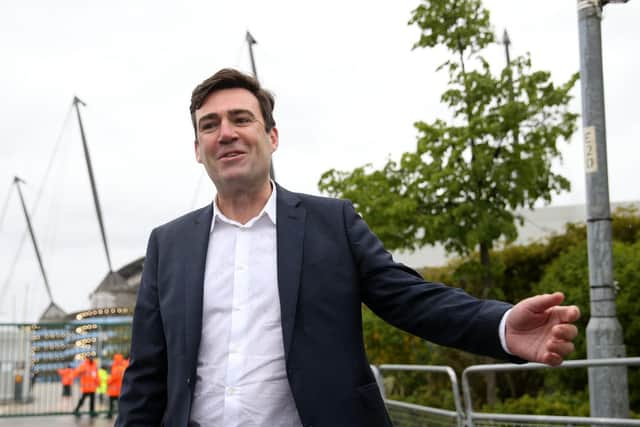Greater Manchester mayor Andy Burnham says government must not stall devolution 'just because the odd mayor has answered back'
Giving evidence to MPs, Greater Manchester mayor Andy Burnham it was in the short-term interests of the Conservative government to work with elected Labour figures like him, West Yorkshire's Tracy Brabin and South Yorkshire's Dan Jarvis to deliver Boris Johnson's 'levelling-up' promises.
Former Labour Cabinet Minister Mr Burnham clashed with central government last year in a high-profile row over the amount of support given to his region to enter into Tier 3 of coronavirus restrictions.


Advertisement
Hide AdAdvertisement
Hide AdUnlike other northern metro mayors, Mr Burnham's authority in Greater Manchester has control of a multi-million pound health and social care budget.
And he told the Public Administration and Constitutional Affairs Committes's hearing on the future of English devolution that having health under regional control "really is a game-changer."
The Government's commitment to devolution has been questioned after a planned White Paper on the subject was delayed and now appears to have been subsumed by a wider Levelling-Up White Paper.
And Mr Burnham, who has been touted in some quarters as a potential successor to Keir Starmer as Labour leader, said the process of changing the way decisions are made was "a work in progress".
Advertisement
Hide AdAdvertisement
Hide AdHe added: "I would say to the Government, don't stall it at this point in time just because the odd mayor has answered back, and that might be politically inconvenient.
"Mayors have a job to do to speak up for those places and I think if mayors of any political persuasion speak up for those places, that helps them counter the feeling of alienation that some places have.
"It's in all of our long term interests, I think, to build a different political culture in England, where more parts of the country are able to do more for themselves, I think that will build a healthier politics.
"If you're starting with place, rather than party, I think you can build a more unifying way of engaging people in the public and political debate.
Advertisement
Hide AdAdvertisement
Hide Ad"What I'd also say to the government is that while it might be in all of our long term interests to see the success of English devolution, I also believe it's in the short-term interest of this government.
"Because the entities that [North of Tyne metro mayor] Jamie Driscoll and I lead will be the vehicles of levelling-up, we are the people that can make levelling up work at scale and make it work more quickly.
"And I think in fact, our interests are aligned here because we want to see levelling up as much as the government."
Mr Driscoll, who was elected as the first ever North of Tyne Mayor in May 2019, said closer working between national bodies and regional leaders would help make a success of failed national schemes like Kickstart, which had a target of creating 250,000 jobs but after nine months had only helped 16,500 people into work.
Advertisement
Hide AdAdvertisement
Hide AdHe said: "If we look at what governments are there to do, to fix problems then there are no easy problems left to fix, they've been done.
"The complex ones, how do we prevent ill health rather than treat disease, how do we integrate transport infrastructure with economic development, how do we apportion costs and revenue, they're fragmented, they're slow, and they produce suboptimal outcomes.
"We have national agencies that may well be internally well run but they're divorced from the democratic parts of the state.
"So Homes England is not integrated with the people who run the planning system, Highways England is not integrated with the transport authorities. Sport England is not integrated with public health.
Advertisement
Hide AdAdvertisement
Hide Ad"We then on top of that have all of the bidding rounds, where you have stalled projects, you can't integrate individual parts of these.
"The solution to this is long term devolve funding for those things that work best on a regional level, or local level, but for those things that should be national projects, strategic highways, for example, let's have a levelling up board where the mayor chairs it with representatives from all the local all the domestic departments, so that when they say look this is our objective here, can you help us deliver it better."
